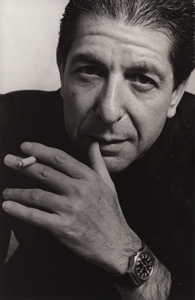
It’s taken me a long time but I think I’ve figured it out: my mom’s affinity for musicians who are good songwriters and poets but TERRIBLE singers has something to do with her being a writer. Let’s be real for a second … when you think of a “good” singer you think of someone like Etta James or Justin Timberlake, not Leonard Cohen or Bruce Springsteen or Bob Dylan.
If you read our blog (reasonably) regularly, you’ve also probably been able to tell that I grew up in a very musical household. You can only imagine what it must have been like hearing these very jarring voices (okay really just talking about Leonard Cohen here) that could be considered the stuff of nightmares to some children. I think because I grew up in a creative household, I was sometimes able to see past it and see the poetry behind it all BUT to say that I always tried and often succeeded in dominating the car stereo on drives is a huge understatement.
After stumbling upon an excerpt in an old Rolling Stone Magazine, I picked up a copy of The Holy or the Broken by Alan Light. You have one guess as to what it’s about. More than one friend seriously made fun of me for reading a book about the cultural significance of one song, but after reading it, I can say that it was one of the most compelling journalistic books I’ve ever read (and one of the more interesting books I’ve recently read during a summer in which I somehow survived The Casual Vacancy and Wicked). I’ve always known the song to be culturally significant, but reading about how it actually came to fruition and publication and then decades later, popularity, got me thinking about my own experience with the song. What’s so unique about it is that it’s almost like a Shakespearean play – beautiful poetry that can be performed and interpreted in so many ways. There have even been different recordings that include or don’t include different verses, giving the song new meaning each time.
Obviously as I read, I had to listen to as many recordings as possible (I’m glad that it’s a common understanding by Bono and those of us unfortunate enough to hear his cover that he blasphemized the song with “trip hop”), only to realize that I can’t honestly remember ever hearing Leonard Cohen’s version.
I’m sure I did, right Mom? The truth is that it’s so underplayed and has taken on such different shape since it’s original recording that each reinvention really feels like an entirely new song. Apparently it became widely popularized because of the movie Shrek (fun fact: John Cale’s version appears in the movie, but the soundtrack has Rufus Wainwright’s recording). If I’m being honest, though, it’s Jeff Buckley’s version from the Season 1 finale of The O.C. that sticks out most in my mind in pop culture (and subsequently at the end of Season 3, Imogen Heap’s chilling cover when Marissa dies). It’s become SO synonymous with TV and film as well as in tributes to disasters (natural and humanly inflicted). There’s no denying that it’s never not effective, but what’s so fascinating is that, like any poem or piece of art, we all find something different in it.
Famous ukulele player Jake Shimabakuru does a beautiful cover that doesn’t convey any sort of sadness, almost just a spiritual reflection.
In one of my favorite “versions,” Adam Sandler wrote a parody to the tune of “Hallelujah” for the 12.12.12 concert with the refrain “Hallelujah / Sandy Screw ya’/ we’ll get through ya,’/ ‘cause we’re New Yorkers.”
What I think is so cool about the song is that you rarely hear of anyone hating it. Maybe people get sick of the song being overplayed in pop culture, but there are enough covers of it that almost anyone can identify with it in a way. There are countless lists that rank the different versions and there are very, very few songs that could be covered in so many different ways and beloved in so many different ways. While I may have desperately tried to change my mom’s cassettes back in the day to Spice Girls or Green Day, there were times where I was forced to listen to the harsh sounds of Leonard Cohen.
Did I know that she was trying to inject me with a spirituality other than what’s learned via religion? Of course not. I wanted Green Day. But if you think about, isn’t music 100 percent spiritual, in a way? We listen to it to the point where we know it by heart. The only thing missing from the movie Inside Out is the part of our brains that is somehow eternally filled with lyrics to songs we don’t need to remember. We sing them back to our favorite musicians at their concerts, where we just want to be one with them in that moment. We silently reflect on music in our cars, or in our living rooms, or while making dinner. We develop our own connotations with different melodies and lyrics. These songs that might not be liked across the board, or sometimes, with a song like “Hallelujah” that might be unanimously appreciated — we find a connection to them by being in a certain space at the time at which they come to us.
. . . And that’s how I felt when I first heard “Dammit” by Blink-182. My poor, poor parents.
*Photograph © Abe Frajndlich

